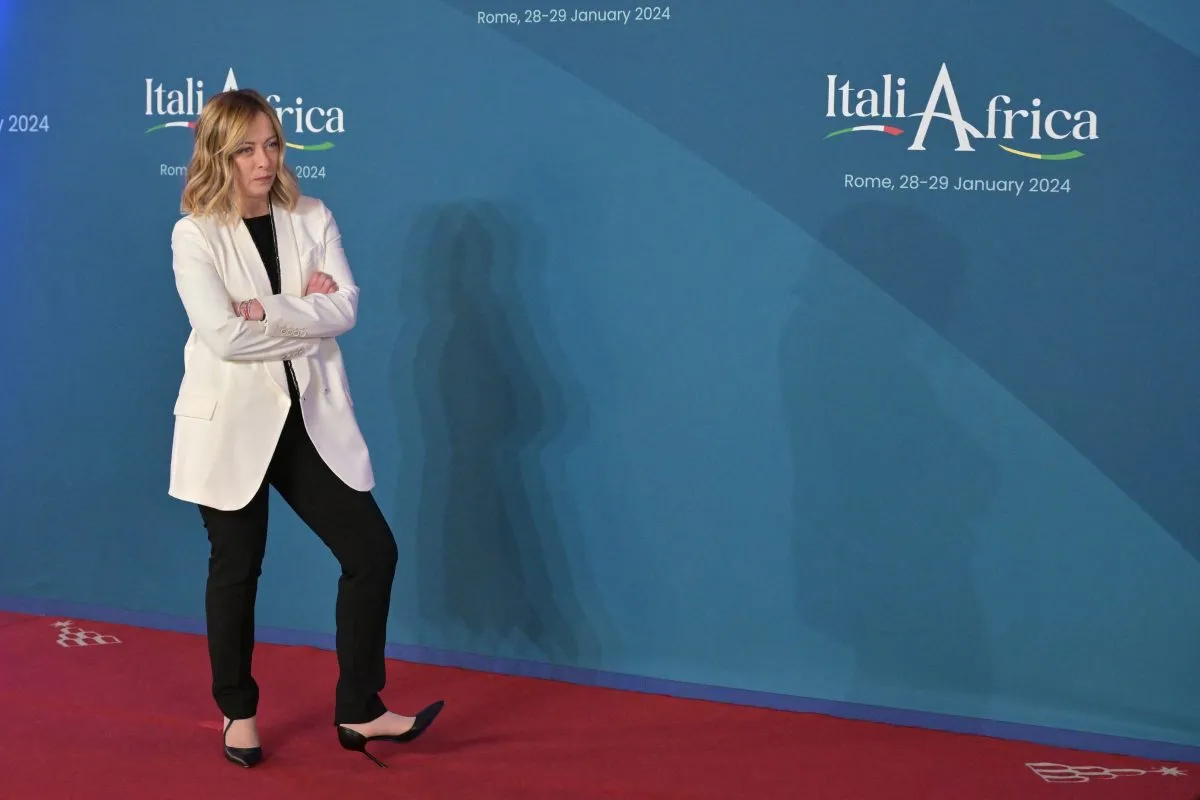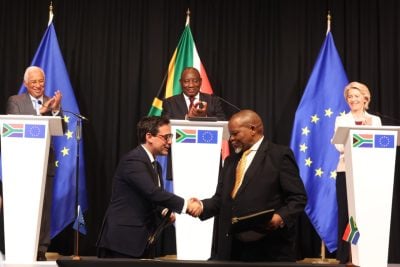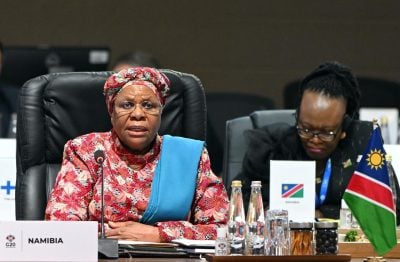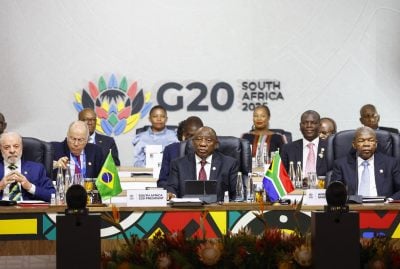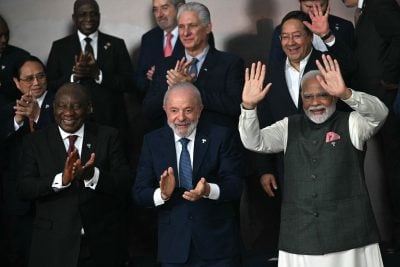In January Italy’s prime minister, Georgia Meloni, outlined a new strategy for relations with Africa at an Italy-Africa summit in Rome. The so-called Mattei Plan – named after the founding president of the Italian energy company ENI, Enrico Mattei – aims to shape a new Italian strategy for Africa by mobilising around €5.5bn for African development over the next five to seven years, principally in the areas of education, health, agriculture, water, and energy.
In return, the tough-talking Meloni, who surged to power last year as part of a migrant-sceptic right-wing resurgence in Europe, argues that substantial development spending in Africa will convince many would-be African migrants to stay at home – and persuade their governments to clamp down on illegal immigration to Europe via the Mediterannean.
Overall, 155,754 migrants from all sources landed in Italy in 2023, compared to 103,846 over the course of 2022, according to reports citing the Italian interior ministry on 29 December.
“Illegal mass immigration will never be stopped, human traffickers will never be defeated, unless the root causes that drive people to leave their homes are addressed,” Meloni told the summit.
In the year that Italy hosts the rotating presidency of the G7, the plan places Rome front and centre in Europe’s diplomatic efforts to forge new relations with Africa on immigration and other key issues of mutual concern.
However, critics say the Mattei Plan remains shrouded in mystery, and its launch was greeted with immediate scepticism by African leaders. At the release of the plan, Moussa Faki Mahamat, chairperson of the African Union Commission, said the organisation “would have liked to have been consulted”.
Akinwumi Adesina, president of the African Development Bank, who held a bilateral meeting with Meloni in Rome in February, told African Business in June that he does not yet know the details of the plan. Other policymakers say they do not have enough details to judge whether the plan could be a success.
“The ambiguity of the Mattei Plan, largely constituted by Meloni’s speech with no comprehensive document outlining specific details, leaves much to be clarified,” Giovanni Carbone, professor of political science at the Università degli Studi di Milano, tells African Business.
What’s in it for Africa?
Bound by ties of geography, Italy has had a long and sometimes tumultuous relationship with Africa. Italy established colonies in Africa between the nineteenth and twentieth centuries – in modern-day Eritrea, Somalia, and Libya. It occupied Ethiopia from 1936 to 1941 under Mussolini’s fascist regime.
That history – as well as the anti-migration concerns of some in modern Italy – can be said to drive a general African scepticism towards Italian diplomatic and economic engagement. The €5.5bn in investment, as proposed by Meloni, will depend on both the willingness of the Italian private sector to invest but also on the approval of African governments.
Nevertheless, Italy has worked hard in recent years to forge relations with the likes of Ethiopia, Tunisia and Kenya, all of which received the Mattei Plan warmly.
“Italy has had more consolidated relations with North Africa, but it is a new phenomenon with sub-Saharan countries. Attention has also focused on the Horn of Africa, where the country has had more established links for decades as a result of colonial occupation,” says Carbone.
Italian investment on the continent has been largely focused on the hydrocarbons industry, with ENI still a major player, active in 12 countries on the continent. The oil and gas major’s interest stretch from involvement in the enormous Coral South liquefied natural gas project in Mozambique to oil exploration in the Niger Delta and a range of hydrocarbons projects in every major North African country.
Yet while the plan’s name gives a nod towards the significance of ENI, it claims ambitions beyond traditional hydrocarbons.
Of the Mattei Plan’s €5.5.bn, €2.5bn will come from the development cooperation budget and the remaining €3bn will come from the Italian National Climate Fund, suggesting a significant shift towards renewable energies.
However, with the funds taken from investment mechanisms earmarked for the Italian private sector, it is unclear to what extent African businesses will be able to benefit from the investment, argues Carbone.
“This is meant to be money that Italian companies can use for projects related to climate issues and renewables. It is however not clear how African businesses can come on board with that. These are supposedly projects that support Africa’s initiatives to tackle climate change.”
Another major problem, Carbone argues, is the plan’s limited financial ambitions.
“Italian resources are not huge and spread over a longer period. €5.5bn is not going to make a difference on the continent.”
Just achieving Africa’s energy and climate goals by 2030, including universal access, will require more than doubling energy investment this decade, rising to a yearly rate of $190bn from 2026 to 2030, data from the International Energy Agency shows. The “new” Italian funds alone are unlikely to provide the step-change needed to offer sustainable and long-term solutions for the many issues facing the continent.
The Italian bilateral effort stands in contrast to the European Union’s ambitious Global Gateway, to which Italy also contributes as a member state. This is predicted to be worth around €150bn to Africa between 2021 and 2027. The Gateway, the EU’s flagship project for developing world investment, has been pitched as a rival to China’s Belt and Road. With its substantial financial firepower, Carbone believes that this could be a more relevant conduit for Italian ambitions on the continent.
“The Global Gateway’s €150bn for Africa would make a difference if it materialises. It doesn’t make sense for Italy to go it alone if the idea is to support Africa’s development,” he says.
Italy’s interests
Nevertheless, the plan could still have positive geopolitical implications for Italy.
The Russian invasion of Ukraine forced Italy, like other European nations, to decrease its dependence on Moscow’s gas, pushing the country into further developing its energy relationships with African countries sich as Libya and Egypt.
“The urge to increase and diversify energy supplies following the Ukrainian crisis prompted the Meloni government to draw up this plan,” Carbone says.
But an overt focus on hydrocarbons could prompt familiar accusations that resource extraction will favour Italy at the expense of its African partners.
“If Europe’s objective is to really favour Africa’s sustainable and long-term development, it needs to move beyond the rhetoric of hydrocarbons, which even the ‘Mattei Plan’ name – in honour of the founder of Italy’s major oil company Eni – embodies,” argue Ghazi Ben Ahmed
, president of the Mediterranean Development Initiative and Andrea Cellino, a senior fellow and head of North Africa at the Middle East Institute Switzerland, in an opinion piece for the Washington Institute.
Carbone says Italy is keen to avoid the “neo-colonial” tag. “I don’t think there are neo-colonial elements in Italy’s approach. Italy certainly has its own interests linked to two central issues: immigration and energy. Neither of these issues is strictly neo-colonial. Of course, energy involves resources from Africa, but neocolonialism usually refers to more than just buying resources.”
But tying extractive investment to the issue of immigration controls – one of Meloni’s major domestic political goals – could prove politically toxic among African citizens, argue Ben Ahmed and Cellino, who say that the policy could see “Meloni recklessly pump African gas and carelessly deport migrants”.
“Any unilateral strategy of a member state, primarily focused on managing immigration in its African policy, is inherently doomed to failure,” they argue. “There is reason to fear that the Mattei Plan [could turn] African leaders… into mere coast guards for the EU, in exchange for a few micro-projects in renewable energies, or even gas. Such an orientation not only risks undermining the depth and richness of Euro-African relations but also reduces African heads of state to peripheral roles, far from the balanced and mutually beneficial cooperation that should characterise the ties between the two continents.”
Want to continue reading? Subscribe today.
You've read all your free articles for this month! Subscribe now to enjoy full access to our content.
Digital Monthly
£8.00 / month
Receive full unlimited access to our articles, opinions, podcasts and more.
Digital Yearly
£70.00 / year
Our best value offer - save £26 and gain access to all of our digital content for an entire year!

 Sign in with Google
Sign in with Google 